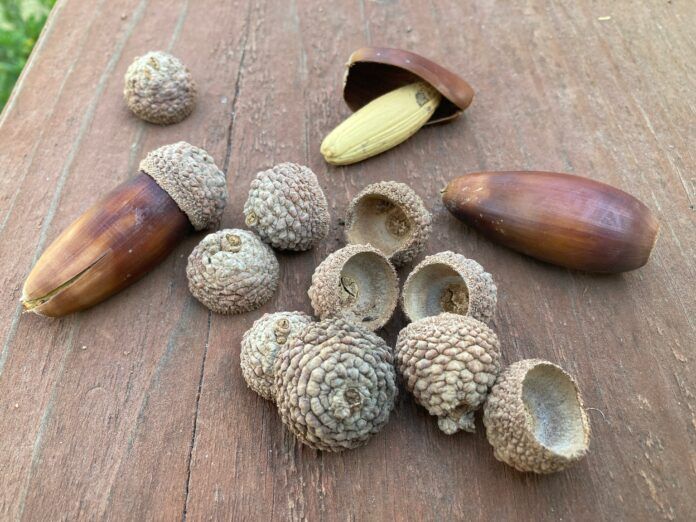Acorns, which are the nuts of oak trees, fall to the ground along with autumn leaves. Oval or round in shape, encased in a hard outer shell, and between 1 and 2 inches in length, acorns are an important food source for deer, birds, and squirrels. Some dogs love to eat acorns, too! But acorns are dangerous to dogs in a variety of ways:
- Acorns can be a choking hazard.
- Wet, fermenting acorns can produce gastrointestinal problems.
- Their tannins (bitter tasting, astringent organic compounds) are potentially toxic to dogs.
- They can create intestinal blockages.
If you live near oak trees, take the following steps to protect your dog:
- Keep your yard raked in the fall – or use a “nut roller” to help reduce the abundance of nuts on the ground.
- Avoid areas where acorns are abundant when going on walks.
- Don’t encourage your dog to catch or play with acorns.
- Be ready to distract your dog from acorns with treats or a toy.
- Teach your dog to “drop” or “leave it” in case he picks one up.
- And finally, if you find your dog munching on acorns, be ready to call your veterinarian.
According to Dr. Erin Ray, Texas A&M University clinical assistant professor at the School of Veterinary Medicine and Biomedical Sciences, acorn or Quercus poisoning is relatively rare among dogs. “Most dogs would need to ingest large quantities of acorns to become sick,” she explained in a 2022 VMBS press release. However, some dogs eating just one or two acorns might experience stomach and intestinal issues like diarrhea or vomiting.
In addition, said Dr. Ray, “Acorns can be physically problematic for dogs if ingested whole or in large pieces. They can cause dogs to choke or get stuck and obstruct the gastrointestinal tract, and they can even cause dental trauma if they are hard enough when chewed on.”
Although serious cases are rare, you should contact your veterinarian for advice if you think your dog has swallowed acorns. Symptoms usually develop within a day and can include vomiting, diarrhea, dehydration, loss of appetite, and abdominal pain.
The medical treatment for acorn poisoning depends on the severity of a dog’s symptoms. Medications for vomiting, diarrhea, or pain may be prescribed along with fluids in serious cases. Radiographs (X-rays) and surgery diagnose and treat intestinal blockages. Larger adult dogs are less likely to develop acorn poisoning than small breeds or puppies, but any dog can overdose on acorns and experience problems.
In June 2021, the Canadian Veterinary Journal published “Successful management of suspected acorn (Querus petraea) toxicity in a dog” by Fernanda Camacho, et al, which described the treatment of a 7-year-old male Labrador Retriever who developed acute kidney injury and liver dysfunction after ingesting acorns. The dog required intensive care hospitalization for six days but made a full recovery. “This report documents that dogs can be affected by this toxicity,” explained the authors, “and it highlights the need for veterinarians to consider acorns as a potential cause of acute hepatoxicity and renal injury.”






